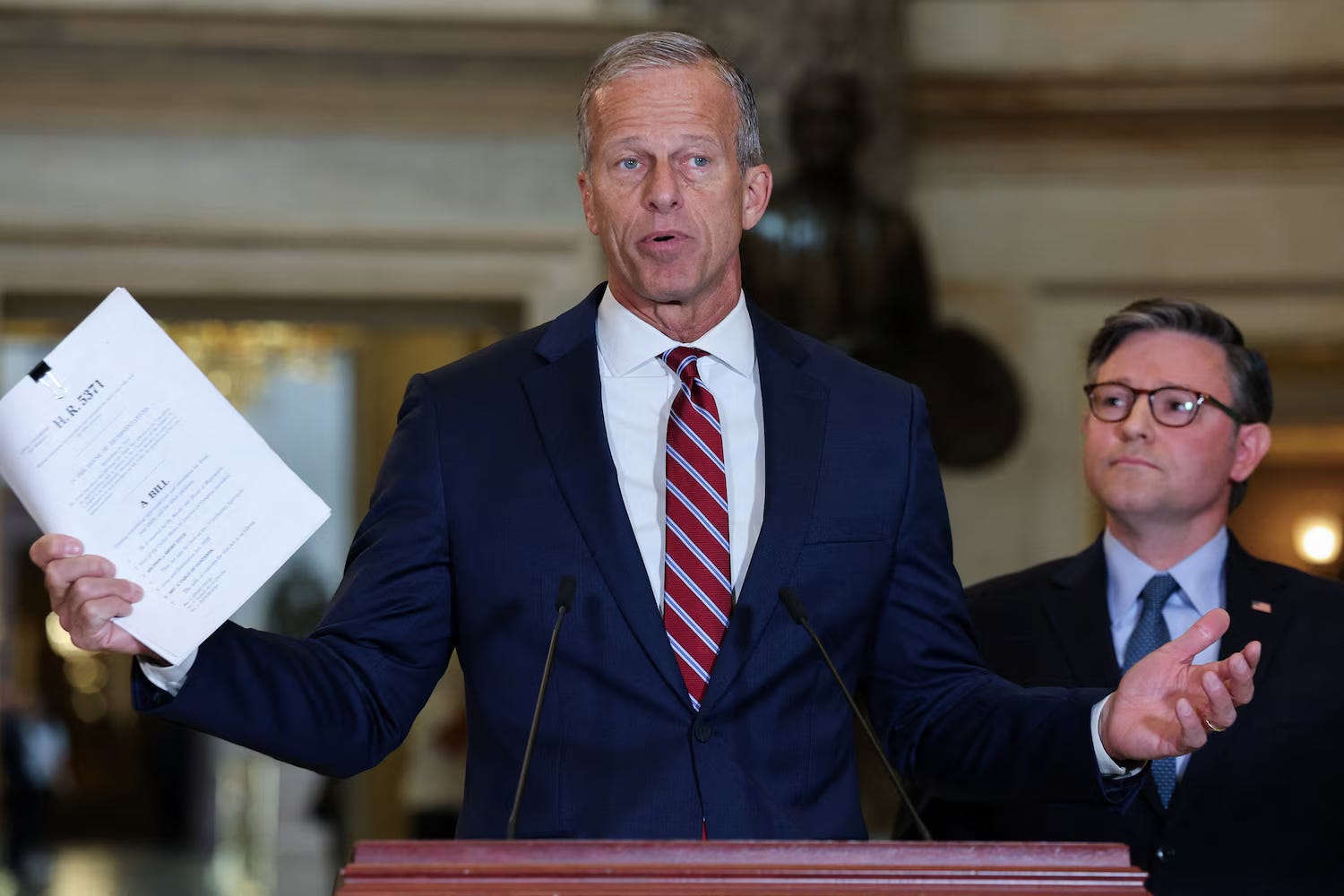The first full shutdown week begins
Plus: a new Supreme Court term begins, Trump’s Oregon power play hits a wall, Chicago reels from an ICE sweep, and Cori Bush launches a campaign for redemption in St. Louis.

First Things First
👋🏾 Hi, hey, hello! Welcome back to Congress Nerd, Once Upon a Hill’s flagship newsletter previewing the week’s legislative storylines for the people who take the votes, write the bills, shape the agenda, move the message, run the campaigns—and those working to influence them. Today is Day 5 of the government shutdown.
In this evening’s edition, what to expect from the new Supreme Court term that kicks off on Monday, why a district court judge blocked President Donald Trump from federalizing Oregon National Guard troops in Portland, the fallout from a controversial ICE operation in Chicago and what to know about former Rep. Cori Bush (D-Mo.)’s just-launched bid to win back the St. Louis congressional seat she held for four years.
But let’s start with the latest on the government shutdown, which enters its first full week this week.
There’s little sign either side is preparing to budge. Democrats remain firm that any agreement must include a written commitment to extend the Affordable Care Act’s enhanced premium tax credits and add guardrails to curb the Trump administration’s perceived executive overreach. Republicans insist the first step must be reopening the government—only then, they say, can policy issues be negotiated.
The House will be out (again) this week after Speaker Mike Johnson (R-La.) canceled votes for the second consecutive week, stating that the GOP has done its job by passing a continuing resolution to keep the lights on through mid-November and placing blame on Senate Democrats for the lapse. But as I wrote on X, much of the Democrats’ message relies on Republicans remaining out of town while the government is shut down. House Minority Leader Hakeem Jeffries (D-N.Y.) wrote in a letter to his members that House Democratic leadership would remain in Washington this week to drive the message that Republicans are on recess while Americans go without paychecks or services and millions could be priced out of healthcare if Congress fails to act.
House Republicans held a conference call on Saturday morning to coordinate messaging: blame Democrats, localize the shutdown’s impact and avoid unforced errors. House Democrats will meet virtually on Monday at 6 p.m. EST for a check-in. Most House Democrats were in town last week, but several members I checked in with over the weekend told me they planned to work in their districts this week. (Members will receive 48 hours’ notice to return to Washington if votes are called.)
The extended recess also delays the swearing-in of Rep.-elect Adelita Grijalva (D-Ariz.), who would be the 218th signer on a bipartisan discharge petition to force a vote on the release of the Epstein files. Johnson disputed claims that the delay was connected to Epstein on NBC. Still, three members (two Republicans and one Democrat) were sworn in the day after they won their special elections—even when the House didn’t conduct official business, so it’s hard to take Johnson at his word.
For the fifth time in 17 days, the Senate will vote on Monday evening on two competing short-term funding bills—the House-passed measure and a Democratic counterproposal. Both currently lack the 60 votes required to advance to final passage, which requires a simple majority. Senate Majority Leader John Thune (R-S.D.) told reporters last week he would continue to bring the House-passed bill to the floor. The hope is that Democrats will pay a political price for repeatedly voting it down. Informal member-to-member talks have stalled, though Republicans expect pressure on vulnerable Senate Democrats to grow as the October 15 military payday approaches.
Hundreds of thousands of federal workers are preparing for the administration to undertake a mass reduction in force as retribution for Democrats’ unwillingness to pass the Republican funding bill.
“I call them Democrat layoffs. They’re Democrat layoffs. They’re causing it. We’re ready to go back. We have a record-setting economy. Prices are way down,” Trump told reporters at the White House this morning. “We’re doing better than the country has ever done, and the Democrats hate seeing that. It’s up to them. Anybody laid off, that’s because of the Democrats.”
FWIW, the Trump administration laid off hundreds of thousands of federal workers before the shutdown. National Economic Council Director Kevin Hassett indicated that the administration would hold off on the layoffs until after the Monday vote to see if Democrats miraculously decided to back the GOP bill.
Neither side behaves like a deal is imminent or even being seriously pursued. No new White House outreach has been made to Democratic leaders, who are framing the standoff around values—health care access and limits on executive power—while Republicans are framing it around process (reopen the government first, then we’ll talk).
Those are fundamentally incompatible priorities. Underneath that, the power dynamic is lopsided. Again, Democrats are staying visible in Washington, projecting responsibility, while Republicans are scattered on recess and relying on message discipline rather than legislative movement. It suggests Johnson and Trump are betting that time and public fatigue will break Senate Democrats before it breaks them.
Republicans are operating under the assumption that five more Senate Democrats will crossover in support of the Republican bill after Sen. Catherine Cortez Masto (D-Nev.) and Angus King (I-Maine) flipped their votes in mid-September, when they initially opposed the Republican funding bill but now support it.
But Thune faces a serious political challenge because the structural, ideological and political incentives all run against Senate Democrats helping Republicans out of this particular jam. Attracting five more crossovers would mean asking them to undercut their party’s unified message that Republicans—Trump, Johnson, and Senate GOP leaders included—manufactured the shutdown by refusing to extend the ACA premium tax credits and rein in executive overreach.
Despite Republicans casting their short-term funding bill as straightforward and nonpartisan, it’s an extension of a March bill that, while enough Democrats supported advancing it to final passage, is a departure from the bipartisan agreement both sides reached last December. Without a compromise to justify flipping their vote, Democrats risk surrendering on the very issues they’ve made central to their messaging.
Not to mention, the shutdown blame game currently favors Democrats. Public polling (including the KFF and Washington Post surveys, as I noted in Thursday’s post) shows voters are more likely to blame Trump and congressional Republicans for the shutdown. Crossing party lines now could muddy that narrative and anger Democratic voters who believe their leaders are finally holding firm on healthcare and checks on executive power.
Thune and Johnson have conditioned any ACA extension on unspecified “reforms,” a signal to the GOP base that Republicans won’t simply rubber-stamp Democratic health policy. But that also makes it impossible for Democrats to sign on without knowing what those reforms entail, especially after years of GOP efforts to roll back ACA protections.
Sticking with the vote math, another aggravating factor to the path forward is that the bench of potentially bipartisan-leaning senators has shrunk.
In the 2024 cycle alone, Democratic and independent-minded dealmakers like Kyrsten Sinema (I-Ariz.), Jon Tester (D-Mont.), Sherrod Brown (D-Ohio) and Bob Casey (D-Pa.) were replaced. Republicans have seen a similar erosion in their ranks with the departures of Roy Blunt (R-Mo.), Richard Shelby (R-Ala.), Pat Toomey (R-Pa.) and Rob Portman (R-Ohio) in recent years. You now have to lean harder on a smaller pool of senators, many of whom are already under pressure from their own party to hold the line.
But the Trump administration’s aggressive use of executive power—freezing funding for projects in blue cities and states and threatening mass firings of federal workers—has hardened Democrats’ resolve and redefined the shutdown as a moral stand in ways Republicans may have underestimated.
Among Hill Democrats, there’s a shared sense that yielding now would legitimize Trump’s bullying tactics and weaken the last institutional check on his authority: Congress’s power of the purse.
Politically, this posture plays directly to a Democratic base that has grown increasingly impatient with compromise. The message from Jeffries, Schumer, and the rank-and-file is clear: We’re standing up to bullies like Trump and White House budget chief Russell Vought. Though adopted at the establishment level far later than the grassroots would have liked, this stance resonates at a moment when many Democratic voters are demanding visible resistance to what they see as executive overreach, even if it means enduring a prolonged shutdown.
Rep. Sydney Kamlager-Dove (D-Calif.) told me she hoped grassroots voters were encouraged to see elected Democrats pushing back against Republicans ahead of the shutdown showdown, including with Proposition 50, the pending special election on a California state constitutional amendment to allow for a one-time mid-decade congressional redistricting in response to mid-decade gerrymandering in Texas.
“We are also standing firm on this shutdown. It is hard knowing that people will be hurt by a shutdown, but the cause is greater than us all, and it requires a painful fight,” Kamlager-Dove added. “In nine months, it is clear that Republicans are both cowards and liars, and they are beholden to Trump. They don’t care about the three-fourths of Medicaid enrollees in red states, just like they don’t care about healthcare premiums doubling. As long as they are not interested in standing up for the American people, Democrats can no longer be interested in working with them.”
Last But Not Least
— Monday is the first day of the new Supreme Court term, which will open with a docket heavy on criminal law, executive power and redistricting fights. Justices will hear cases on whether police can enter homes without warrants under emergency claims, whether presidents can unilaterally impose tariffs and how much race can be considered in drawing voting districts. Campaign finance, transgender rights in sports and attorney-client privilege protections are also on the calendar. With a 6–3 conservative majority, the court’s rulings could expand presidential power and narrow civil rights protections, while shadow docket orders will likely continue shaping high-stakes disputes.
The Trump administration is expected to appeal a temporary restraining order this weekend by Oregon federal judge Karin Immergut, which blocks President Trump and Defense Secretary Pete Hegseth from federalizing 200 Oregon National Guard troops to patrol protests in Portland.
The court ruled Trump exceeded his authority under federal law and violated the Tenth Amendment by overriding the state’s control of its Guard without proof of rebellion or an inability of federal law enforcement to enforce the law.
The decision marked the second major judicial rebuke of Trump’s National Guard deployments following California’s earlier case, underscoring judicial skepticism toward his use of military force in domestic settings.
— The city of Chicago is still reeling as federal agents descended on a South Shore apartment building before dawn Friday in what witnesses described as a military-style raid: helicopters overhead, flashbangs echoing through hallways and families pulled from homes. Officials later confirmed that the overnight operation was part of Operation Midway Blitz, a Trump administration initiative to target undocumented immigrants and alleged gang activity in the Windy City.
By Saturday morning, President Trump had ordered the federalization of 300 members of the Illinois National Guard, overriding Democratic Gov. J.B. Pritzker’s refusal to deploy them. The White House framed the move as necessary to “protect federal officers and assets,” citing protests and what it called “lawless resistance” outside Chicago-area immigration facilities. But Pritzker blasted the demand as “outrageous and un-American,” accusing the administration of using federal troops for “a manufactured performance.”
The Illinois Democratic congressional delegation swiftly closed ranks behind the governor. Sen. Tammy Duckworth called the raid “a grotesque abuse of power,” while Rep. Delia Ramirez said “no president should terrorize Chicago families to score political points.” Local officials reported that many of those detained in South Shore had no criminal record, contradicting the administration’s claim that agents were pursuing “the worst of the worst.”
The confrontation sets up a new chapter in the constitutional showdown between state and federal authority as protests grow outside the Broadview ICE facility and civil rights groups seek court orders to block further raids. Pritzker has vowed not to mobilize state forces “to advance Trump’s acts of aggression against our people,” while DHS officials insist more enforcement actions are coming “in the days ahead.” What happens next may test the boundaries of federal power within state borders — and the political limits of Trump’s second-term immigration crackdown.
— Former Rep. Cori Bush (D-Mo.), who served two terms in Congress before losing the Democratic primary in 2024, announced her comeback bid last Friday for her old deep-blue St. Louis seat. She lost reelection to AIPAC-backed Wesley Bell, the city’s former prosecuting attorney, after a bruising race that highlighted divisions between progressives and establishment Democrats over the war in Gaza.
Bush’s announcement frames the current government shutdown and Washington dysfunction as proof that the district needs her brand of movement politics. In a December 2024 exit interview with Once Upon a Hill, she reflected on her tenure—recounting how she “scraped” her way into Congress, how delivering $41 million in community funding and navigating floods while walking through sewage deepened her sense of accountability, and how she viewed her departure not as an end but as a new phase of the activism that led her to Washington in the first place.



